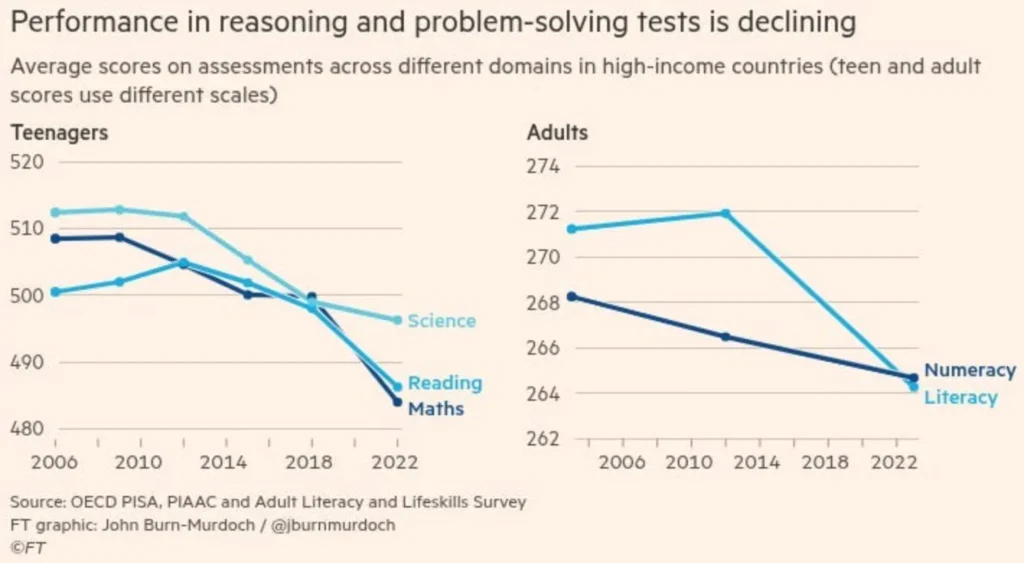Modern thought leaders; the decline of thinking; search as entertainment: Newsletter 1 October 2025

Newsletter 113. Principles for principled thought leadership. Plus, the value of “time under tension,” endless PR, three people to follow and three books to read.
The thought leader’s pledge
Nineteen years ago, my soon-to-be coauthor Charlene Li told me that our objective was to become “thought leaders.” That sounded pretty cool. I wasn’t much of a people leader, but the concept of helping people with useful and powerful ideas seemed like a useful ambition. It fit nicely with the insights I was posting about on my blog (another Charlene suggestion) and giving occasional speeches about. So I started to think of myself as one of them thar thought-leader types.
A lot has happened in the subsequent decades. Thought leaders graduated from posting on blogs to writing books, creating podcasts and video series, and sharing their views everywhere from what was once called Twitter to Instagram to LinkedIn. Being a thought leader devolved into shouting as loudly and outrageously as possible about whatever came to one’s mind in whatever channel was near at hand, then promoting the heck out of whatever you had shouted about. And we entered the era of “influencers” who, unlike business thought leaders, were famous just for being famous or if not, at least, good-looking.
What happened next, of course, is that the very term “thought leader” started to gain a tinge of self-promotional icky-ness. “You can’t be a thought leader,” we were told, “unless somebody else says you are.” And “You need to have lots of followers.” And “You have to give it way for free.” And who knows how many other rules made up be people who were, presumably, trying to be thought leaders on the idea of thought leadership.
I paid very little attention to this. I was far more interested in the “thought” part than the “leader” part. Finding out interesting things and writing about them to some level of audience certainly seemed worth doing, so I kept doing that.
Now that there are so many pretenders shouting so loud about their thought leadership, I’d like to get back to basics. I do things my way. My way is not the only way, but of course, I think it is the best way. So in my view, if you want to be a thought leader, you should have no problem taking this pledge:
- I know my audience, which is a defined group of people with a defined set of problems.
- I have a defined field of expertise, in which you I hope to be an authority. I am not an authority outside of that space, and I don’t purport to be.
- I continually seek opportunities to expand my knowledge in and connected with my field of expertise, and to serve my audience with that expanded knowledge.
- I regularly share what I have learned in socially accessible digital spaces. My audience learns to expect such posts.
- When events and announcements happen in my space, I use my knowledge to share useful insights about those events.
- To the extent possible, I’m also visible in physical spaces, such as conferences in my field of expertise.
- I treat the intellectual property of others respectfully and give credit where it is due.
- For the most part, I promote knowledge, not myself.
- While I may make money in various ways from selling my expertise, that’s not what I’m known for. I’m known for what I share freely.
- I think growing and sharing my knowledge is fun. That’s one reason I do it. The other reason is the value it creates for others.
There. I wrote it down. These are words I can live by.
How about you, fellow thought leaders? How about you?
News for writers and others who think
Derek Thompson writes about the decline of thinking in the AI age and recommends an individual solution: “Thinking benefits from a … principle of ‘time under tension.’ It is the ability to sit patiently with a group of barely connected or disconnected ideas that allows a thinker to braid them together into something that is combinatorially new.” Yeah. Let’s do more of that.
On Jane Friedman‘s blog Shanetta McDonald shares the naked truth: book PR is never finished, and you need to do most of it yourself.
Christian J. Ward suggests that in the AI era, search is now conversational entertainment. Intriguing.
A federal court finalized the settlement between Anthropic, which makes Claude, and the authors and publishers whose work they’d ripped off. Check back in the next few days at this site, which will share which books are getting compensation. But it’s going to take the better part of a year for any of us to get paid.
Did you know Captain Kirk and Mr. Spock fought in Vietnam? I know it’s true: I’ve seen the video. (Sorry, not sorry.)
Three people to follow
Brian Walker , commerce and technology expert
Betsy Atkins — if you’re interested in being on a board, she knows everything about it
Cindy Gallop — implementing radical ideas, regardless of convention
Three books to read
Quiver, don’t Quake: How Creativity Can Embrace AI by Nadim Sadek (Mensch Publishing, 2025). Using AI to supercharge your own creative ability.
The Fifth Risk: Undoing Democracy by Michael Lewis (W.W. Norton, 2019). This seems like the right moment for a definitive analysis of what happens when government stops functioning.
Reversing the Curse: Inside the 2004 Boston Red Sox by Dan Shaughnessy (Mariner Books, 2017). Bedside reading for the Boston-New York rematch.